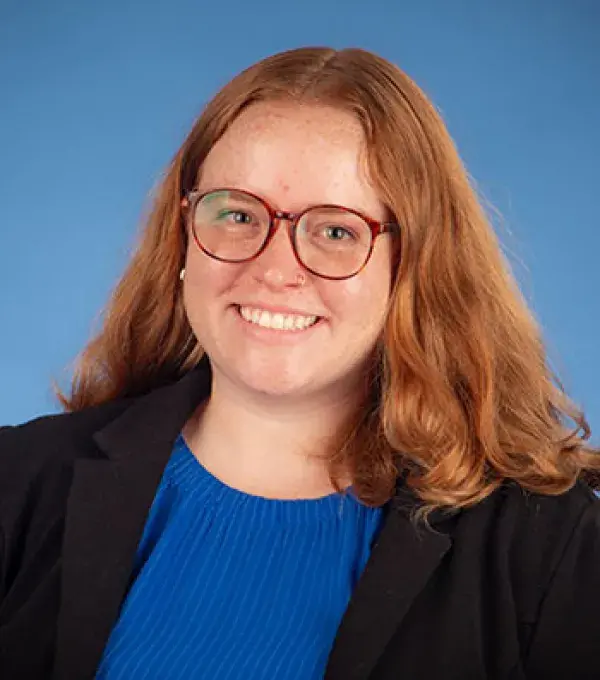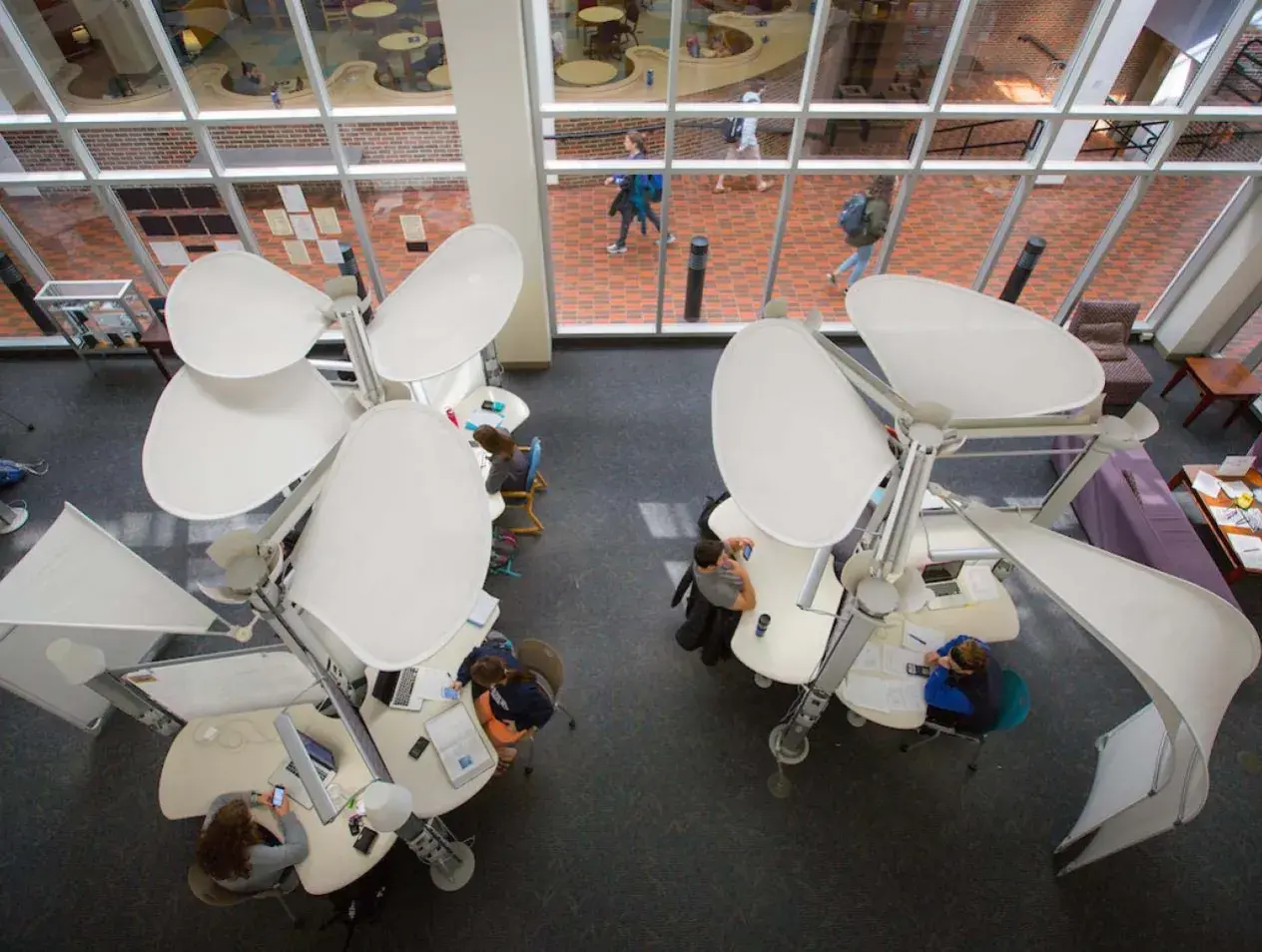
Student Accessibility Services
Student Accessibility Services focuses on providing equal access and opportunities which lead to student success.
Mission Statement
The Office of Student Accessibility Services cultivates an accessible and inclusive community where students with permanent and temporary disabilities have an equal opportunity to participate in all aspects of campus life. We facilitate student advocacy, learning, and access through partnerships with students, faculty, and staff.
Accommodations Requests
Academic Accommodations
- Academic accommodations are for adjustments within courses, such as coursework, accessible documents, etc.
- To request an academic accommodation, log into the Student Accessibility Services Portal and click on the Intake and Self Registration buttons.
Housing Accommodation
- Accommodations for housing can be requested through the online housing accommodation request form.
- Questions about dietary restrictions? Reach out to our Registered Dietitian.
Injury/Temporary Accommodation
- Students can request a injury/temporary accommodation through the online temporary accommodation request form.
Core Values
- ADVOCATE for all students
- Ensure ACCESS
- COLLABORATE across campus
- Practice COMPASSION
Requesting Accommodations
Creighton University is committed to providing services and resources to meet the needs of qualified students with disabilities, ensuring equal access to academic programs and University facilities. Guided by Section 504 of the Rehabilitation Act of 1973, the American with Disabilities Act of 1990, and the ADA Amendment Act of 2008, Student Accessibility Services coordinates the process through which all students request and receive reasonable accommodations, working closely with faculty and staff to meet individual needs.
Student Eligibility
Section 504 of the Rehabilitation Act of 1973, the Americans with Disabilities Act of 1990, and the ADA Amendments Act of 2008 provide for reasonable accommodations and services to qualified individuals with disabilities.

Frequently Asked Questions
Accommodations in college differ from those in high school mainly in purpose and responsibility. In high school, under IDEA and Section 504, schools identify and support students to ensure success through IEPs or 504 Plans. In college, under the ADA and Section 504, the focus shifts to providing equal access, not guaranteed success. Students must take the lead by disclosing their disability, providing documentation, and requesting accommodations. Colleges do not modify academic standards but ensure students have an equal opportunity to meet them.
No. Disclosure is completely voluntary. You are not required to tell the university about your disability unless you want to request accommodations. Once you make that request, you may be asked to provide documentation that verifies your disability and explains how it impacts you.
You can request an initial intake meeting with a member of Student Accessibility Services at any point during your time at the university, though it’s best to do so as early as possible—ideally before classes begin. The process usually involves completing an intake form, submitting documentation, and meeting with a staff member to discuss your individual needs. Many accommodations require advanced planning, and early identification of a student’s needs helps to ensure that arrangements and accommodations can be made in a timely manner. Please note that during busy times in the semester, it may take longer to schedule a meeting and finalize the process.
When requesting academic accommodations in higher education, students are typically required to provide current and comprehensive documentation that establishes the existence of a disability and explains how it substantially limits one or more major life activities, particularly learning. Acceptable documentation may include a diagnostic report or evaluation from a qualified professional, such as a physician, psychologist, or specialist, which should be on official letterhead, dated, and signed. This report should include the diagnosis, the date of diagnosis, the condition’s current impact, and specific recommendations for accommodations with a clear rationale. For learning disabilities or ADHD, recent psychoeducational or neuropsychological testing is often required, including standardized assessment results and interpretation. Medical documentation for physical or mental health conditions should describe the functional limitations and any relevant treatment plans. While prior IEPs, 504 plans, or accommodation letters from other institutions can provide helpful background, they are generally not sufficient on their own since college-level standards differ from K–12. Documentation should be current, typically within the last three to five years, and the institution reviews each request individually to determine reasonable accommodations that ensure equal access without altering essential academic requirements.
There are no deadlines for when a student can begin the documentation process to apply for accommodations. However, accommodations will not be provided retroactively after a student is approved for accommodations.
After your accommodations are approved, you typically receive an official accommodation letter to share with instructors. Faculty are only informed of the accommodations you need to access your courses; they are not given details about your diagnosis or medical history.
If you disagree with an accommodation decision, please contact the Office of Title IX. You may also contact external agencies such as the Office for Civil Rights. Open communication with disability services and faculty is encouraged to resolve issues collaboratively.
The Office of Student Accessibility Services has access to the documentation you submitted. Information provided to Student Accessibility Services is confidential and will not be shared with other offices.

Student Responsibility
Self-disclosure of a disability to Student Accessibility Services for the purpose of receiving reasonable accommodations is the student’s responsibility. Each student must participate directly in an interactive process to determine appropriate accommodations.
Please note that diagnosis alone does not establish a need for reasonable accommodations as a Creighton University student.
Our goal is to understand how your disability individually impacts you so that an appropriate plan can be developed to meet your specific needs. We welcome medical documentation of your physical or mental impairment to help us make informed decisions. We value all relevant supporting documentation that you can provide to verify your disability and understand how disability impacts you as a student.
Examples of helpful supporting documentation include: an accommodation plan from your prior school; proof of accommodations used on standardized exams; a neuropsychological or educational evaluation; relevant medical records and reports of the impact of disability; vocational assessment; a statement from a treating provider or diagnostician that includes any of the following information:
- The current physical or mental impairment(s) and the history of diagnosis (including how the diagnosis was determined);
- Anticipated prognosis (if applicable);
- Specific symptoms, including frequency, severity, and triggers;
- The current treatment plan;
- The impact of the impairment(s) on major life activities and/or major bodily functions.
- Major life activities may include caring for oneself, performing manual tasks, seeing, hearing, eating, sleeping, walking, standing, lifting, bending, speaking, breathing, learning, reading, concentrating, thinking, communicating, and working.
- Major Bodily Functions may include functions of the immune system, normal cell growth, digestive, bowel, bladder, neurological, brain, respiratory, circulatory, endocrine, and reproductive functions.
- Any professional recommendations or strategies that would mitigate the impact of the disability, including any relevant history of accommodations used in the past.




report multiple diagnoses
Student Accessibility Services Staff

Carrie Brink, PhD
- Director of Student Accessibility Services
- View Profile

Matthew Brody, MBA
- Assistant Director, PHX Campus
- View Profile

Julie Dixon, MEd
- Associate Director of Student Accessibility Services
- 402.280.5951
- View Profile

Joe Ecklund, PhD
- Assistant Vice Provost for Advising & Support
- 402.280.5531
- View Profile

Morgan Frushour
- Assistant Director
- 402.280.3823
- View Profile

Gillian Price, MBA
- Assistant Director of Student Accessibility Services
- 402.280.2145
- View Profile
Contact Information
Student Accessibility Services
2500 California Plaza
Old Gym, Suite 223
Omaha, NE 68178
Located on the 2nd floor of the Old Gym
Building number 22 on the Campus Map
Testing Center - 2 locations with the 4th floor being the main area:
- 4th floor; room 437 and 2nd Floor room 224
- Old Gym - x2166 (Gillian Price oversees the testing center)
Student Resources
- Student Accessibility Services Portal
- How-To Video: Registering and Generating Accommodation Letters in the Student Accessibility Services Portal
- How-To Video: Scheduling an Exam through the Student Accessibility Services Portal
- Download: PowerPoint of “Registering and Generating Accommodation Letters” and “Scheduling an Exam through the Student Accessibility Services Portal” how-to videos
- Campus Map
- Counseling Center
- Academic Coaching
- Resources for Job Seekers with Disabilities
Family Resources
Staff and Faculty Resources
- Accessibility Services Portal
- How-To Video: Confirming Accommodation Letters in Accessibility Services Portal
- How-To Video: Exam Scheduling in Accessibility Services Portal
- Download: PowerPoint of the “Confirming Accommodation Letters” and “Exam Scheduling in Accessibility Services Portal” how-to videos
- Download: Student Accessibility Syllabus Statement
- Accessibility, Accommodation, & Awareness Committee
Confidentiality
Documentation of a disability is kept on file at Student Accessibility Services. Students must sign a release of information form before Student Accessibility Services may disclose information the individual’s disability and approved accommodations. Students must request communication from Student Accessibility Services to specific faculty, administrators and offices in order for accommodations to be provided by those faculty/administrators/offices.




